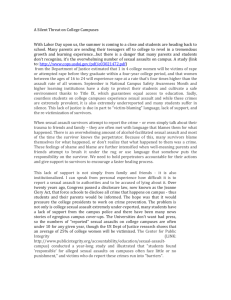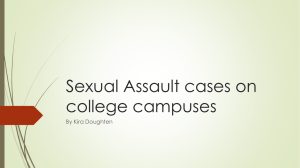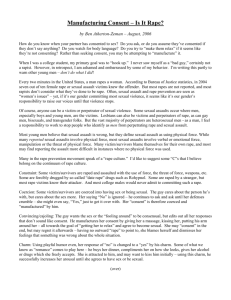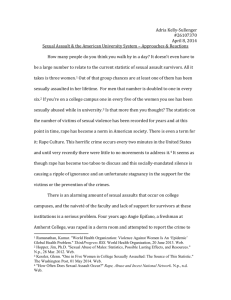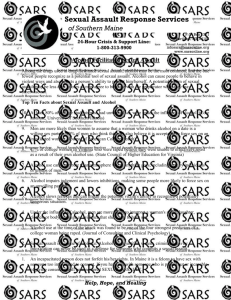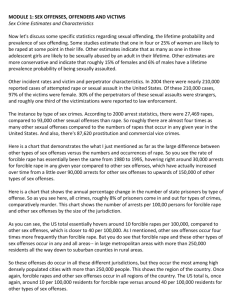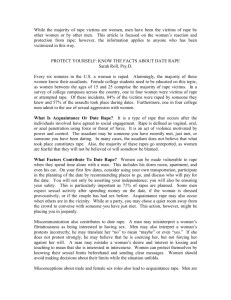Additional Material Found Here
advertisement
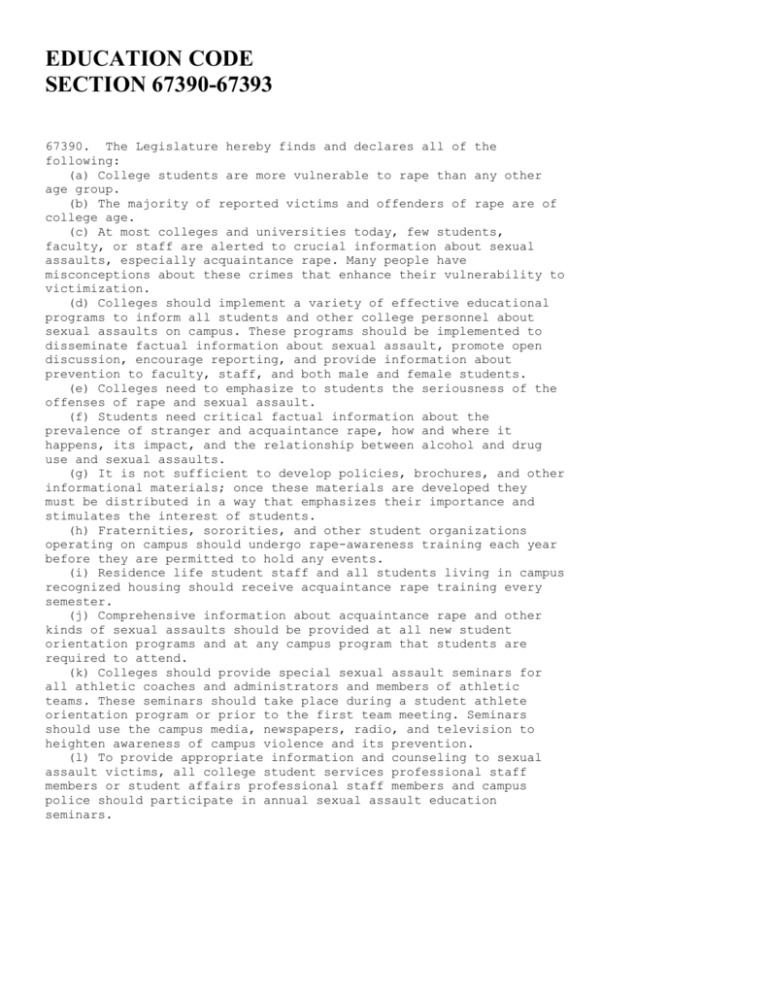
EDUCATION CODE SECTION 67390-67393 67390. The Legislature hereby finds and declares all of the following: (a) College students are more vulnerable to rape than any other age group. (b) The majority of reported victims and offenders of rape are of college age. (c) At most colleges and universities today, few students, faculty, or staff are alerted to crucial information about sexual assaults, especially acquaintance rape. Many people have misconceptions about these crimes that enhance their vulnerability to victimization. (d) Colleges should implement a variety of effective educational programs to inform all students and other college personnel about sexual assaults on campus. These programs should be implemented to disseminate factual information about sexual assault, promote open discussion, encourage reporting, and provide information about prevention to faculty, staff, and both male and female students. (e) Colleges need to emphasize to students the seriousness of the offenses of rape and sexual assault. (f) Students need critical factual information about the prevalence of stranger and acquaintance rape, how and where it happens, its impact, and the relationship between alcohol and drug use and sexual assaults. (g) It is not sufficient to develop policies, brochures, and other informational materials; once these materials are developed they must be distributed in a way that emphasizes their importance and stimulates the interest of students. (h) Fraternities, sororities, and other student organizations operating on campus should undergo rape-awareness training each year before they are permitted to hold any events. (i) Residence life student staff and all students living in campus recognized housing should receive acquaintance rape training every semester. (j) Comprehensive information about acquaintance rape and other kinds of sexual assaults should be provided at all new student orientation programs and at any campus program that students are required to attend. (k) Colleges should provide special sexual assault seminars for all athletic coaches and administrators and members of athletic teams. These seminars should take place during a student athlete orientation program or prior to the first team meeting. Seminars should use the campus media, newspapers, radio, and television to heighten awareness of campus violence and its prevention. (l) To provide appropriate information and counseling to sexual assault victims, all college student services professional staff members or student affairs professional staff members and campus police should participate in annual sexual assault education seminars. EDUCATION CODE SECTION 66250-66252 66250. This chapter shall be known, and may be cited, as the Equity in Higher Education Act. 66251. It is the policy of the State of California to afford all persons, regardless of disability, gender, gender identity, gender expression, nationality, race or ethnicity, religion, sexual orientation, or any other basis that is contained in the prohibition of hate crimes set forth in subdivision (a) of Section 422.6 of the Penal Code, equal rights and opportunities in the postsecondary educational institutions of the state. The purpose of this chapter is to prohibit acts that are contrary to that policy and to provide remedies therefor. 66252. (a) All students have the right to participate fully in the educational process, free from discrimination and harassment. (b) California's postsecondary educational institutions have an affirmative obligation to combat racism, sexism, and other forms of bias, and a responsibility to provide equal educational opportunity. (c) Harassment on school grounds directed at an individual on the basis of personal characteristics or status creates a hostile environment and jeopardizes equal educational opportunity as guaranteed by the California Constitution and the United States Constitution. (d) There is an urgent need to prevent and respond to acts of hate violence and bias-related incidents that are occurring at an increasing rate in California's public schools. (e) There is an urgent need to teach and inform students in the public schools about their rights, as guaranteed by the federal and state constitutions, in order to increase students' awareness and understanding of their rights and the rights of others, with the intention of promoting tolerance and sensitivity in postsecondary educational institutions and in society as a means of responding to potential harassment and hate violence. (f) It is the intent of the Legislature that each postsecondary educational institution undertake educational activities to counter discriminatory incidents on school grounds and, within constitutional bounds, to minimize and eliminate a hostile environment on school grounds that impairs the access of students to equal educational opportunity. (g) It is the intent of the Legislature that this chapter shall be interpreted as consistent with Article 9.5 (commencing with Section 11135) of Chapter 1 of Part 1 of Division 3 of Title 2 of the Government Code, Title VI of the federal Civil Rights Act of 1964 (42 U.S.C. Sec. 1981, et seq.), Title IX of the Education Amendments of 1972 (20 U.S.C. Sec. 1681, et seq.), Section 504 of the federal Rehabilitation Act of 1973 (29 U.S.C. Sec. 794(a)), the federal Individuals with Disabilities Education Act (20 U.S.C. Sec. 1400 et seq.), the federal Equal Educational Opportunities Act (20 U.S.C. Sec. 1701, et seq.), the Unruh Civil Rights Act (Secs. 51 to 53, incl., Civ. C.), and the Fair Employment and Housing Act (Pt. 2.8 (commencing with Sec. 12900), Div. 3, Gov. C.), except where this chapter may grant more protections or impose additional obligations, and that the remedies provided herein shall not be the exclusive remedies, but may be combined with remedies that may be provided by the above statutes.

